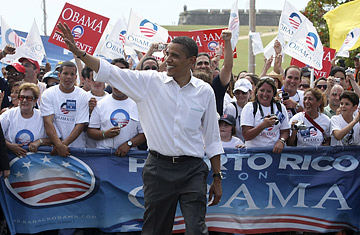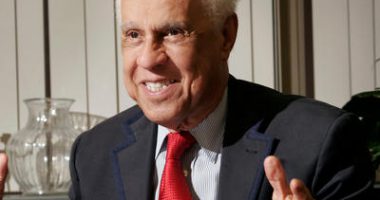RICHMOND —
A couple of weeks ago my attention was called to an article on Real Clear Politics highlighting the fact that the president and his team see Virginia as a key battleground that Barack Obama must win if he is to be reelected. As such, the campaign already has launched an early and aggressive effort to win my home state’s 13 electoral votes in November 2012.
That column and its messages — overt and subtextual — came back to mind when I was exploring accounts of President Obama’s recent trip to Puerto Rico. Critics have complained that his administration is detached and cool in his treatment of Puerto Ricans. Similar criticism has been aired by some black leaders as to his administration’s relations with the black community — and with regard to other minority communities, if I am to be perfectly frank.
The president risks solidifying the perception his attention is an election-year gift that shouldn’t be counted on after the Inaugural platform is dismantled.
Congressman Luis Gutiérrez, an experienced advocate for Hispanic Americans — Puerto Ricans and those seeking Puerto Rican independence, specifically — said of the president’s five-hour trip to the island that the journey was more symbolic than substantive. Gutiérrez criticized the president for saying one thing during the 2008 presidential campaign, then doing little since to improve Puerto Rico’s 20 percent unemployment rate, not to mention the negligent effort that has been made to shore up Puerto Rico’s overall economy.
Gutiérrez went out of his way to stress that the Obama visit to Puerto Rico mostly was about 2012 reelection politics: targeting the rising influence of Puerto Ricans voters in key swing states — Florida and Pennsylvania, for instance — and other states (such as New York, Illinois, and New Jersey) where around 4.5 million Puerto Rican votes will be vital to the presidential contest. The trip was not about concrete policy.
When Gutiérrez was pressed by a reporter about whether he would support the president’s re-election aggressively, Gutiérrez was coy.
The congressman said he would like to see Obama reelected. Gutiérrez is, by all accounts, a good Democrat who represents the president’s adopted hometown and state of Chicago, Illinois.
Yet, “coy” is a proper characterization because after Gutiérrez was further pressed about how aggressively he would campaign for President Obama, Gutiérrez went on to add that unless the president delivered on some of the promises he has made during 2008 and since, “it would be irrelevant” what Gutiérrez could or would do in support of the president’s campaign.
Gutiérrez made a point of repeating those words during the interview.
I am not unfamiliar with the line of questioning Congressman Gutiérrez faced about Obama’s visit to Puerto Rico and about his chances to win in 2012. It is reminiscent of some of the questions I am asked about the president’s relationship with minority communities, and whether Obama’s chances for reelection look good. Often those questions are framed for me to analyze them on a national scale, but I always also try to gauge my responses using the on-the-ground, first-person experiences I witness across the commonwealth of Virginia.
Voters in Virginia and around the nation are becoming less reliant on political parties. They are becoming more independent in their voting choices. Candidate Obama benefited greatly from that shift in voting patterns during his 2008 electoral effort. Many are starting to question whether he will have similar outcomes in 2012, or if some outreach to independent-minded voters of all persuasions (those on the left, the right, and in the middle) may be less effective four years later because the ties that bound have been allowed to fray.
I have long believed that the people are always ahead of political leaders — and that conviction strengthens almost daily.
As I reflect on Congressman Gutiérrez’s comments — the ones I describe as coy — it’s not hard to wonder whether he might very well be foretelling coming events. But this early that still is not a certainty — though we may be uncomfortably close.
Unless there is meat put on the bones of 2008’s promises of hopes and dreams … unless some fulfillment is realized by those who stood in endless lines to vote because they truly believed in the man and the cause … then Langston Hughes’s perennial question returns in haunting refrain: What does one do with a dream deferred?








